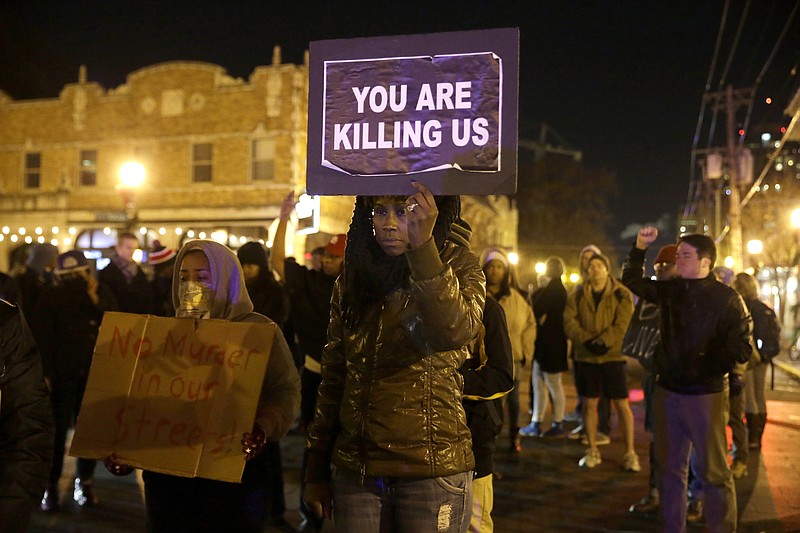When state Rep. Courtney Allen Curtis heard the St. Louis County grand jury had decided not to indict white police officer Darren Wilson in the fatal shooting of unarmed black teenager Michael Brown, he was standing outside the Ferguson Police Department among a crowd of disappointed protesters.
The crowd heard "four supposed shots that were fired" after Prosecuting Attorney Robert McCulloch made the announcement Monday night, Curtis, D-Ferguson, said.
He watched as protesters began to move toward the police. Some chanted and urged peaceful protest. Others began overturning a police vehicle, looting, rioting and setting fire to businesses. Several were hit with tear gas. In the end, 61 were arrested throughout the night.
Curtis said the protesters were expressing mounting frustration with a legal system infused with institutionalized racism. His constituents are demanding change, he said, and legislators in Missouri's Black Caucus are determined to deliver it in the upcoming legislative session.
"People protest in different ways for a variety of different reasons," Curtis said, explaining why some in the crowd resorted to violence. "The non-violence movement brought some change, but that change wasn't permanent. ... So if you make a bigger spectacle of it, then it will bring more attention and force change."
Rep. Brandon Ellington, chair of the Black Caucus, didn't condone the rioting, either, but he tried to explain why the protesters turned to arson and looting.
"When you've got people who are feeling overtly oppressed, then they act out with the only means they can," Ellington, D-Kansas City, said.
Caucus members were as disappointed as their constituents by the grand jury's decision, but they were not surprised.
"However, I am extremely surprised with the prosecutor's tone," Ellington said about McCulloch.
Ellington was especially taken aback that McCulloch cast blame on the media and witnesses, instead having "no blame for the officer that was involved in the shooting."
Members of the caucus have already begun to address their constituents' disillusionment.
Even before Monday night's news conference, Rep. Karla May, D-St. Louis and vice chair of the Black Caucus, and Rep. Sharon Pace, D-St. Louis, met with Ferguson Mayor James Knowles, City Manager John Shaw and City Councilman Mark Byrne to consider possible reforms.
The group discussed legislation that caucus members plan to pre-file Dec. 1, including bills that would require police officers to wear body cameras and to participate in psychological testing and diversity and sensitivity training, Pace said.
In addition, they talked about incorporating a restorative justice plan that would allow adults charged with minor violations to participate in community service rather than pay fines. That plan would include some of those arrested during the Ferguson protests.
"We got feedback from both sides, and I think the meeting went very well as far as (Ferguson city officials) being receptive to what we were discussing," Pace said.
Caucus members are aware the bills won't see swift and easy passage through the legislature.
"The question is, can we come up with something that the majority party can get along with? Because they're largely from rural areas, so they don't have the same concerns," Curtis said. "There's a lot of strategizing taking place, a lot of conversations being had."
Ultimately, members of the caucus hope that whatever reform they can achieve will lead to greater stability and equality in Missouri.
"I just hope for peace," state Sen. Maria Chappelle-Nadal, D-University City, said. She learned that rioters burned down an office where she teaches civic engagement classes twice a week in Ferguson.
What's most important, Chappelle-Nadal said, is that Missouri implements "systematic change" that transforms "institutional prejudice, which is penetrated throughout state government and other institutions."

